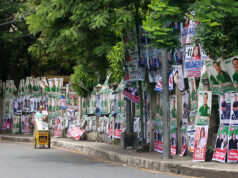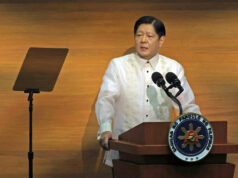Coffee farmers thrive despite challenges
The changing and extreme weather conditions continue to pose a challenge to farmers all over the country but members of the Masiag Farmers and Coffee Growers Association, Inc. (MAFACGA) in Bagumbayan, Sultan Kudarat, continue to thrive, thanks to their desire to become better farmers.
“All of us have been growing coffee trees for years but we started growing coffee as an association in 2012 after we realized it was more sustainable,” MAFACGA President Jennifer N. Farillon said in an interview.
The association of agrarian reform beneficiaries has grown from 45 to 249 farmer-members, with each member tilling his or her own coffee farm in varying sizes from three to nine hectares.
The ARB association banks on its Mang Felipe coffee brand which was named after one of the earliest settlers who pioneered coffee growing in the area. Today, MAFACGA does not only grow coffee trees but also produce several varieties of robusta coffee that are sold as brewed, roasted, instant and green coffee.
“Our green coffee beans is pure and unadulterated coffee beans that has less…cholesterol than ground green coffee,” Ms. Farillon said. The pure green coffee, which is available at P300 per kilo, is sought by those who want to enjoy healthy coffee.
The farmers have improved not only the packaging of their finished coffee products but also the process of growing coffee. Compared to growing 800 coffee trees per hectare, they are now able to grow 1,111 trees per hectare after adjusting the distance of the trees from 5×3 meters to 2×3 meters.
Ms. Farillon said out of 2,000 kilos of fresh coffee beans every year, only 700 kilos of green coffee can be produced. The fresh coffee beans they produce are sold to Nestle and other traders.
“We could not supply the demands of Nestle and the other traders as our production has gone down by almost 50% because of the rain,” she said. However, she is confident that they will be able to get more yield from their coffee farms during summer.
Ms. Farillon cites the support from different sources including the Philippine Rural Development Project (PRDP) which provided them P13 million in loans.
PRDP is a six-year project that aims to provide climate-smart farmers technology, infrastructure, information and facilities to help improve their productivity, income and competitiveness. A loan approved last year will be fully implemented this year and will be used for infrastructure development, and for the purchase of a forward elf for the transportation of the farmers’ coffee produce. MAFACGA will invest in an equity worth P1.8 million for the purchase of a solar dryer and other equipment.
Bagumbayan is known as a coffee-growing community and MAFACGA is just one of the many farmers groups that have made coffee their primary means of livelihood. Barangay Masiag, however, is one of the barangays that produce rich and high-value coffee beans.
The Department of Agrarian Reform (DAR) realized the potential of the province for coffee growing, and through the Mindanao Sustainable Agrarian and Agriculture Development (MinSAAD), built a coffee processing facility in the nearby Municipality of Sen. Ninoy Aquino two years ago to increase the competency of farmers from being mere producers of raw coffee beans to becoming producers of high-value coffee products.
The processing plant includes a 36-square-meter building and a 180-square-meter solar dryer with provisions for coffee processing equipment which includes grinder, roaster and a de-huller machine. The project aims to increase the income of around 1,600 agrarian reform beneficiaries in the province.
“The goal is to help the farmers establish a coffee enterprise,” said MinSAAD Project Manager Eduardo E. Suaybaguio, during the Usapang Kalakalan ng DAR-MinSAAD Project held in Davao City last month.
DAR-MinSAAD is a poverty alleviation project being implemented in 12 marginalized settlements in Mindanao. Mr. Suaybaguio said the project aims to address poverty issues through sustainable agriculture.
He said the project has adopted a Project Investment Plan (PIP) covering 105 Agriculture, Agribusiness and Agro-forestry Development (AAAD) sub-projects, 78 Farm to Market Roads (FMR), 14 Bridges, 76 Post Harvest Facilities (PHF), 20 Irrigation and 52 Rural Water System (RWS) sub-projects.
“The major component of MinSAAD is agriculture, agribusiness and agroforestry with the challenge of shifting farmers’ mindset from being mere producers to becoming entrepreneurs,” he said.
The Project area covers 217 barangays in 27 municipalities with a total area of 517,482 hectares. MinSAAD covers 12 settlements covering seven provinces namely Lanao del Norte, Bukidnon, North Cotabato, South Cotabato, Sultan Kudarat, Compostela Valle and Davao del Sur.
The Sultan Kudarat Resettlement Area Phase 2, which includes 28 barangays in the municipalities of Sen. Ninoy Aquino, Bagumbayan and Palimbang, is one of the MinSAAD project areas. The settlement is predominantly an agricultural area with a total of 105,869.75 hectares, 67,502.48 hectares of which is agricultural.
DAR-MinSAAD has partnered with MAFACGA not only in the conduct of various trainings on nursery and plantation establishment but also in the care, maintenance, harvesting, post harvest operations and processing of coffee. Through the project, a community nursery was established and now provides a sustainable source of quality coffee seedlings.
MAFACGA was able to produce 37,500 coffee seedlings as planting materials for coffee production. Its members received the planting materials and were able to plant 37.5 hectares with coffee. — Carmencita A. Carillo



